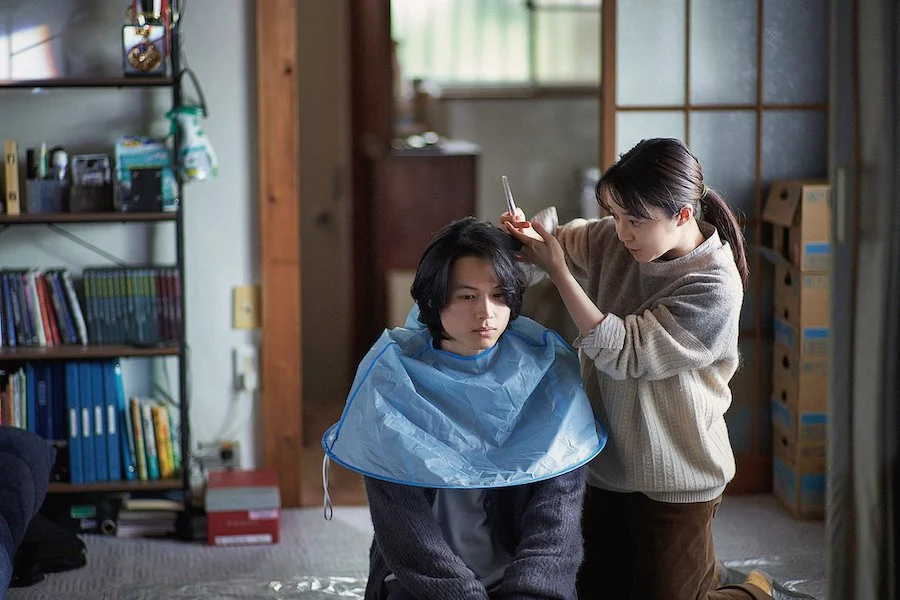‘Long’ Overdue
That thoughtful, grown-up Japanese drama you’ve been waiting for has finally reappeared.
All the Long Nights
Director: Sho Miyake • Writer: Sho Miyake, Kiyoto Wada, based on the book by Maiko Seo
Starring: Hokuto Matsumura, Mone Kamishiraishi, Ken Mitsuishi, Ryo, Kiyohiko Shibukawa
Japan • 1hr 59mins
Opens Hong Kong June 27 • I
Grade: B+
Rarely has a movie relied on the chemistry of its leads to carry it along quite as intensely as director Sho Miyake’s All the Long Nights | 夜明けのすべて does, and to add fuel to the fire, it’s a chemistry resolutely not rooted in romance. This is truly shocking; clutch your pearls. Japanese cinema of late has been maggoty with inappropriate relationships between socially inept characters that aren’t nearly as charming as the filmmakers think they are (though nothing is worse than fucking Narratage). Like he did with his low-key covid wonder Small, Slow But Steady, Miyake keeps the camera focused on his main players, Misa Fujisawa (Mone Kamishiraishi) and Takatoshi Yamazoe (Hokuto Matsumura), a pair of pariah who find comfort, empathy and companionship with each other – and never once shed a single man-tear or awkwardly kiss. Praise be! It is possible.
Admittedly nothing happens in All the Long Nights. It’s not about an event, a quest, or a star-crossed romance. It’s just about two people that are forced to the margins of Japanese society and are compelled to make the best of kind of shitty circumstances. If you really wanted to, you could reduce it to “misadventure asking if men and women can be friends”, but not only is that a tired binary in 2024, it sells the narrative short. Shot in intimate, naturalistic 16mm by Yuta Tsukinaga, Miyake’s crafted an keenly observant and optimistic counterpoint to the idea that we’re all alone, told by damned adults. I can’t stress how refreshing this is.
We meet Misa when she’s having the mother of all period pains, in the rain (because Japanese directors can’t resist a good downpour) on a bench outside her office. She’s a relatively fresh grad so she’s trying to make a good impression, but she has Hell PMS and she’s snappy, irritable, forgetful, all sorts of good stuff. Needless to say, this is Tokyo so her office mates are mostly uptight grey-haired men, and before you can say “Tampon dispenser in the women’s bathroom, please!” her corporate career is over before it really starts. Years later, she’s settled in with a small manufacturer of scientific gear for kids. It’s a much better work space, her colleagues are cool, they’re understanding and respectful of her monthly freak-out and Misa’s happy. Into this little office comes Takatoshi, who suffers from a panic disorder that similarly drove him from the big city to this quiet town. He has his own freak-out when he misplaces his meds one day, and Misa recognises the symptoms of something no one else really gets. She finds them, and a friendship is born.
The magical employer responsible for this non-toxic, egalitarian work environment is Kazuo (Ken Mitsuishi), who along with Takatoshi’s former co-worker Norihiko (Kiyohiko Shibukawa), is a member of a support group for people who’ve lost friends or family to suicide. Unsurprisingly, they’re a bit more attuned to other people’s sensitivities, and it’s one of the reasons Norihiko pointed Takatoshi towards the little company. Misa mostly has her mother (Ryo) for support, always ready with an open door or a kick in the ass, whichever is required. By the time Misa and Takatoshi mount a mobile planetarium show for some local school kids, they’ve each found a way to muddle through to lives that may be less exciting than the ones they left behind, but are fulfilling in their ways.
The real magic trick in All the Long Nights is how Miyake and writer co-writer Kiyoto Wada make Misa and Takatoshi into fully rounded characters that we root for, that we want to see find a semblance of peace and acceptance, without filtering them through rose-coloured glasses – because they can both be massive dicks. Misa internalises her outbursts to the point that she comes off as irritatingly eager to make amends, rarely standing up for herself. Takatoshi often treats his disorder like an inconvenience, which makes him arrogant enough to believe the job with Kazuo is beneath him. They’re quick to judge each other, but they do commit to doing the work to understand. It all makes their evolutions that much more rewarding, and everyone else’s willingness to manage them with kindness and compassion worth the effort. It proves that yes, we can be better, even if we don’t want to be.
Which doesn’t get Japan’s contemporary office spaces off Miyake’s hook. He doesn’t put Tokyo corporate culture on blast, but it’s close. It’s unspoken but the workplace is inferred to be the root of almost everyone’s stresses and stressors in All the Long Nights. But as despondent as Miyake can be about rigid work standards and expectations, and as unhealthy as he clearly thinks they are, Tsukinaga’s gauzy, hopeful images telegraph a happy ending. And, believe it or not, one that’s not contingent on a boy/girlfriend. — DEK



